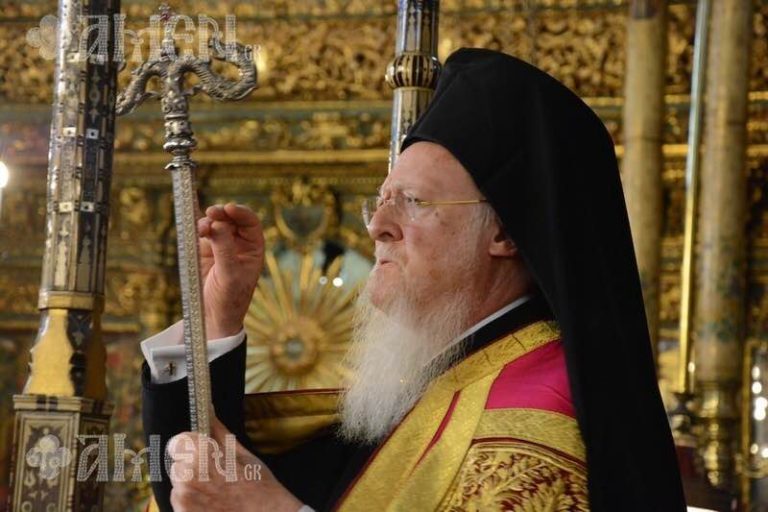
On 22 October 2016, His All-Holiness Ecumenical Patriarch Bartholomew celebrated the 25th anniversary of his election as the 270th Archbishop of Constantinople-New Rome and Ecumenical Patriarch, successor of the Holy Apostle Andrew, in the presence of 51 bishops of the Ecumenical Patriarchate, representatives of the Churches of Jerusalem and Cyprus, of the Roman Catholic Church and of the Greek State, clergy, monastics and laity who attended the festive Divine Liturgy for this memorable occasion. At the end of the Divine Liturgy, His Eminence Senior Metropolitan Constantine of Nicea greeted His All-Holiness who responded with a homily⇒ recounting his quarter of century on the throne of Saint Andrew.
Born Dimitrios Arhondonis on the island of Imbros (Turkey) on 29 February 1940, Ecumenical Patriarch Bartholomew graduated from the Theological School of Halki (Turkey) in 1961, and continued his studies at the Pontifical Oriental Institute in Rome, where he got a doctorate on Canon Law in 1968. He also pursued post-graduate studies at the Ecumenical Institute of Bossey (Switzerland) and at the Ludwig Maximilians University of Munich (Germany). He was ordained a deacon in 1961, a priest in 1969 and became the Metropolitan of Philadelphia in 1973. He was elected Ecumenical Patriarch on 22 October 1991 and enthroned on 2 November 1991. As Ecumenical Patriarch responsible for the ministry of communion, he is regarded as the “primus inter pares” (first among equals) of the hierarchy of the Orthodox Church and spiritual leader of Orthodox Christians worldwide. He speaks fluently Greek, Turkish, Italian, German, French and English.
The quarter of century of his patriarchal ministry was characterised by the strengthening of inter-orthodox relations thanks to his charismatic leadership. Since his enthronement, he has regularly convened Meetings (Synaxis) of the Primates of the Orthodox Church and accelerated the process of the preparation of the Holy and Great Council of the Orthodox Church, planed since 1902, and its successful convening in 2016. Patriarch Bartholomew also made the ecumenical movement for the unity of Christians one of his priorities, and for this reason was recently praised as “a Great Ecumenist”. His efforts to promote inter-religious dialogue, peace, religious freedom and human rights were widely noted, as he was one of the signatories of the Bosphorus Declaration (1994) that stated that “a crime committed in the name of religion is a crime against religion”. His initiatives to promote ecology and the protection of the environment have earned him the title of “the Green Patriarch”. As Pope Francis has written in his encyclical Laudato si (2015), “Patriarch Bartholomew has spoken in particular of the need for each of us to repent of the ways we have harmed the planet. (…) At the same time, Bartholomew has drawn attention to the ethical and spiritual roots of environmental problems, which require that we look for solutions not only in technology but in a change of humanity; otherwise we would be dealing merely with symptoms. He asks us to replace consumption with sacrifice, greed with generosity, wastefulness with a spirit of sharing” (Laudato si, 8–9).
A recent biography⇒ by Rev. Dr. John Chryssavgis describes Ecumenical Patriarch Bartholomew as an Apostle and Visionary. With a foreword by Pope Francis, this biography contains heartfelt contributions of Pope Benedict XVI, the former Archbishop of Canterbury Rowan Williams, Rabbi David Rosen and other world dignitaries. It unveils a picture of this exceptional man who has longed to serve God, the Church and the world his entire life.